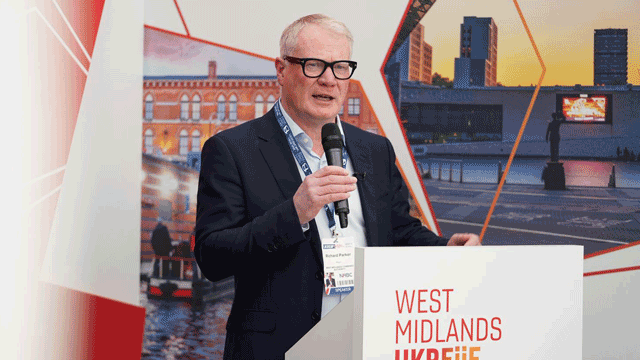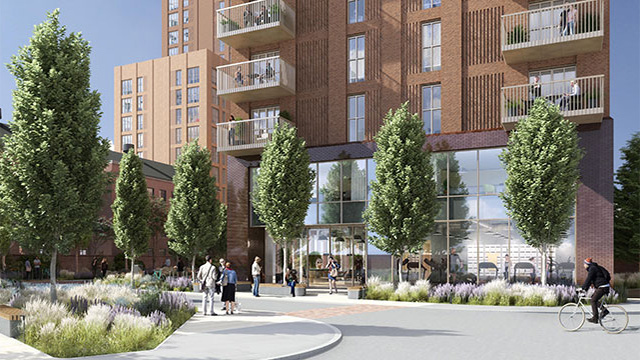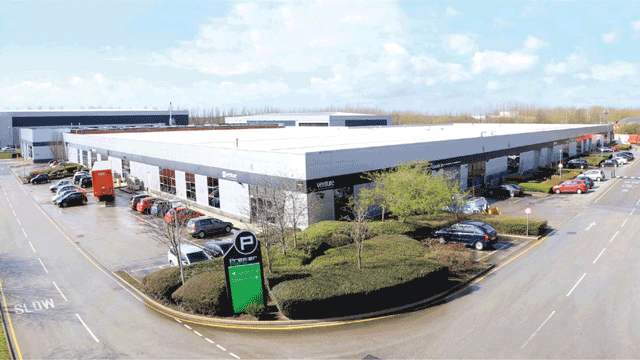by Brian Reeves
Pioneering the new West towards 2000 — whether West of Scotland or Western Europe — Glasgow has taken most of the credits on the Scottish scene and, as a strategic regional centre, is poised to benefit in 1992 from the strong financial, cultural and diplomatic links already established in Brussels.
A national model of progress and this year’s Cultural Capital of Europe, Glasgow possesses a unique business environment forged by private enterprise and public participation, producing some of the best commercial developments in the UK, and it is currently a focus of American, European and Japanese interest.
In this city of cities, E = MC2 where E denotes enterprise, M for metropolis, C for culture, with the power of 2 signifying twice the progress of any UK city in the past decade. A formula for development, a formula for success.
Yes, it is Glasgow, where the verse “I belong to Glasgow” is now “Success belongs to Glasgow”; where “Dear Old Glasgow Town” means zone A rents of £150 per sq ft; where “a Deal’s a Deal for a’ That”, and an agent is a legend in his own lunchtime.
Einstein would admit that it is all “relative”, particularly against the global events in Russia, Germany and South Africa — but, in the Europe of tomorrow, Glasgow could be a leading Euro-player possessing the political stability, financial muscle and cosmopolitan appeal to develop in harmony with its European counterparts. “Ich bin ein Glaswinner”, could soon replace the slogan “Glasgow(s) Miles Better”.
From years of struggle to regeneration, Glasgow has earned wide international respect, particularly evident at this year’s MIPIM property show in Cannes. Transformation on a grand scale — a city reflecting vision, growth, productivity, planning, infrastructure, technology, capital investment, a buoyant property market and a dynamic local economy.
Over the past year there continued to be a very real business buzz in the city, a sense of optimism (with its foundations in the Glaswegian penchant for humour) and an expectation of greater things ahead, undeterred by the backcloth of a flat UK market and high interest rates.
Now the UK’s third largest urban centre, Glasgow dominates Scotland’s 5m indigenous consumer market with a city population approaching 1m and a catchment population close to 2.5m. Outside London, it leads the property investment field with circa £2bn of private investment either planned or under way.
In the field of tourism, Glasgow is one of the UK’s faster growth areas with a threefold increase in visitors since 1982 and attractions such as the Garden Festival, the Burrell Collection and now its designation as European City of Culture in 1990.
Glasgow has distinguished itself in the office and retail sectors through pioneering office projects such as Glasgow & Oriental’s Broomielaw and DCI’s Northgate development. Prime office rents are now at £17 per sq ft with £20 per sq ft expected by the year-end. In a European context this compares with Barcelona at £20, Paris at £33, Frankfurt £22, Madrid £28 and Brussels at £13 per sq ft.
The office market has reflected a healthy supply/demand synergy and steady rental growth in contrast to some of the European centres, including Lisbon and Brussels. Edinburgh’s erratic growth in comparison reflected prime office rents at £5 per sq ft in 1975, £7 in 1984, £12 in 1987 and now at a staggering £25 per sq ft thanks to a drastic supply shortage and a complete underassessment of demand.
Hence Glasgow’s office market is starting to benefit from its supply side capability, appealing to both indigenous Scottish companies and also southern-based firms who are attracted by lower occupational overheads, good living standards and environmental benefits.
In the retail sector, Glasgow’s shopping facilities are now of international quality, with the new 280,000-sq ft St Enoch Centre — by far the best in Scotland — slightly reminiscent of Toronto’s Eton Center. The new 550,000-sq ft Buchanan Centre, when completed, will consolidate the city’s position, assisted by the successful Princes Square development and schemes coming on stream — including Whatco’s proposed Gardens multi-functional centre.
Glasgow’s prime Argyle Street rents of around £150 per sq ft zone A compare with Edinburgh’s prime Princes Street, and also with the prime locations in Munich and Cologne at $230 per sq ft. In a global context, however, none of these quite compares with prime Tokyo at $675 per sq ft and New York’s Trump Tower at around $525 per sq ft.
Critics may still point to the superiority of retailing in Hong Kong or the USA, such as the nine-storey San Francisco Center (with its Mitsubishi spiral escalators), but the comparison is unfair and there is a limit to the design capability which can be imported from America with its advantages of catchment and spending power. Washington and Chicago, for example, possess unemployment rates of a mere 3% and 5% respectively, with Glasgow slightly above the UK average, although currently reducing.
With regards to investment, the Glasgow market, although resilient, has been affected by the overall UK situation, seeing fewer deals and less conventional funding arrangements, but this is perceived as temporary and the overall development sector has still advanced. In the industrial sector, further potential exists where rents are artificially low, and both Glasgow and the M8 corridor generally are destined to benefit where the demand for Class 4 use has exacerbated this shortage. Glasgow is behind Edinburgh in the business park sector, partly owing to the Strathclyde region’s original policy of resistance to these new schemes designed to protect the city-centre office market.
Following further guidance from the Secretary of State, the situation is gradually crystallising, with Class 4 planning applications totalling around 3.5m sq ft currently under consideration.
A number are located in the vicinity of Glasgow airport, including the latest application from Carter Commercial Developments containing complementary hotel and leisure uses.
Glasgow’s urban regeneration has benefited considerably from Strathclyde region’s links with both Brussels and Strasbourg, which has secured some £300m in grant aid to date with a further £390m in the pipeline as a pump primer for the £1bn industrial development and job-creating scheme under the Integrated Development Operation (IDO). Indeed, Strathclyde possesses a permanent lobbying office in Brussels as part of its long-term strategy for the Continent, generating links with other European regions.
Immense benefits to Glasgow and its environs have also accrued from the activities of the SDA, which is now amalgamating with the training boards to form the new Scottish Enterprise with the SDA’s portfolio planned for disposal. The loss of the SDA’s name is, however, unfortunate, since it is a valuable goodwill asset synonymous with Glasgow and Scotland as a whole.
Beneficial use of underutilised land has proceeded well and will continue — land owned by public and private sectors such as British Rail, the local authorities, the Waterways Board and British Gas — although in some cases financial assistance will be essential. Much has been achieved in Glasgow, but there is still work to be done; although, fortunately, here things get done, facilitated by the city’s stable political and business climate. The Merchant City area has seen great improvement, Kantel being major contributors through their Cochrane Square development — the latest phase of a 750,000-sq ft scheme to include 91,000 sq ft of offices plus retail.
Ambitious proposals exist for a World Trade Centre at the Scottish Exhibition Centre Campus by World Trade Centre Holdings, and also a futuristic office plan by Taylor Woodrow at Anderston, subject to their concluding a financial deal with ground landlord Glasgow District Council.
In the leisure field, however, Glasgow has yet to distinguish itself in international terms, although a number of exciting plans are under way. These include Tom Wisekopf’s proposals for a major golf course/country club on the bank of Loch Lomand, a mere 10 minutes’ drive in a Porsche.
Although Glasgow’s hotel facilities are comparable with many UK cities, it does not possess a five-star hotel, but this is imminent, with known requirements from Ramada, Sheraton, Norfolk Capital, Hyatt and the Hilton proposal. Strong demand within the two- to three-star market, however, could be quickly absorbed by the Broomielaw scheme and similar locations. Notably, the US group Quality International have a planned investment programme for Europe for their budget price Sleep Inn chain, with Glasgow a contender.
Geared to its catchment and foreign tourist influx, Glasgow could benefit from more adventurous leisure facilities — an Imax or Omnimax cinema to complement existing multiplex provision and perhaps themed leisure. Euro Disneyland as planned near Paris would be too ambitious, but a more modest idea such as Ontario Place in Toronto, for a Clyde location as opposed to Loch Lomond, would be appropriate.
Although Glasgow’s financial aid from the EC under the IDO scheme will tail off after 1993, it has already achieved major objectives and the momentum should be sustained.
On all fronts the city and business community must prepare for the changes in competition which will result from the single European market in all sectors — retail, heavy industry, hi-tech and bio-technology, offices, and the service sector, hotels and the leisure industry.
Future competition will be difficult to predict and too many studies pertaining to Glasgow and the other main Scottish cities are retrospective, analysing past trends at a time when industrial restructuring was under way, with too little attention to the newly formed property base and projected business.
Glasgow is confident of retaining and improving its international position and conscious of the strategic importance of infrastructure and communications links to Europe to counterbalance the dominance of London assisted by the Channel tunnel.
Certainly, Glasgow airport has recently benefited from the Government’s open skies policy and, with the long-term improvement in air links to continental Europe and the USA, the Glasgow business community will be better placed to compete in an increasingly global market-place.










